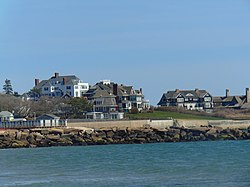| High Watch | |
|---|---|
 High Watch (left) partially visible on Watch Hill | |
| Former names | Holiday House, Harkness House |
| General information | |
| Type | House |
| Architectural style | Colonial-style[1] |
| Location | 16 Bluff Avenue, Watch Hill, Rhode Island 02891 |
| Coordinates | 41°18′28.8″N 71°51′19.08″W / 41.308000°N 71.8553000°W |
| Construction started | 1929 |
| Completed | 1930 |
| Owner | Taylor Swift |
| Technical details | |
| Floor area | 11,000 sq ft (1,000 m2) |
High Watch (formerly named Holiday House but locally known as the Harkness House) is an 11,000-square-foot (1,000 m2) home in Watch Hill, a historic district in Westerly, Rhode Island, United States. The most expensive private home in Rhode Island,[2] High Watch has been owned by American singer-songwriter Taylor Swift since 2013 and is a subject of publicity and media attention, mostly known for being the venue of Swift's annual Independence Day parties, attended by a range of celebrities.
A Colonial-style mansion, High Watch sits on a 5-acre (2.0 ha) seafront estate that includes a private beach. The estate is situated atop Watch Hill's namesake hillock, which was used as a lookout point during the Seven Years' War and the American Revolution.
The house was built in 1929–1930 for the Snowden family, owners of an oil company, who named it Holiday House. It was purchased in 1948 by Rebekah Harkness, socialite and Standard Oil heiress, who became notorious amongst the local residents for her lavish lifestyle there. In 1974, businessman Gurdon B. Wattles purchased and renovated the house, renaming it as High Watch due to its location. Swift purchased the house for US$17,750,000 in 2013, and inspired by its history and Harkness, released the song "The Last Great American Dynasty" in 2020.
Several stalking, trespassing, and home invasion incidents have been reported at the house since Swift's purchase. In 2015, High Watch inspired a proposal by the then-Governor of Rhode Island, Gina Raimondo, to impose a luxury tax on expensive secondary homes in the state but was quickly withdrawn following criticism that claimed such a tax would be detrimental to the state's tourism industry. In 2017, Swift was sued by her neighbors over her decision to build a seawall on the beach as plaintiffs argued the beach had been dedicated to the public over the years and Swift had no ownership of it; the courts ruled in Swift's favor, asserting the seawall prevents coastal erosion.
- ^ David, Mark (28 April 2013). "Taylor Swift Spends Big in Rhode Island". Variety. Archived from the original on 28 January 2022. Retrieved 7 December 2020.
- ^ Tremaine, Julie (2020-07-28). "A Brief History of Taylor Swift's Rhode Island Feud". Vulture. Archived from the original on 2022-04-11. Retrieved 2022-10-20.

